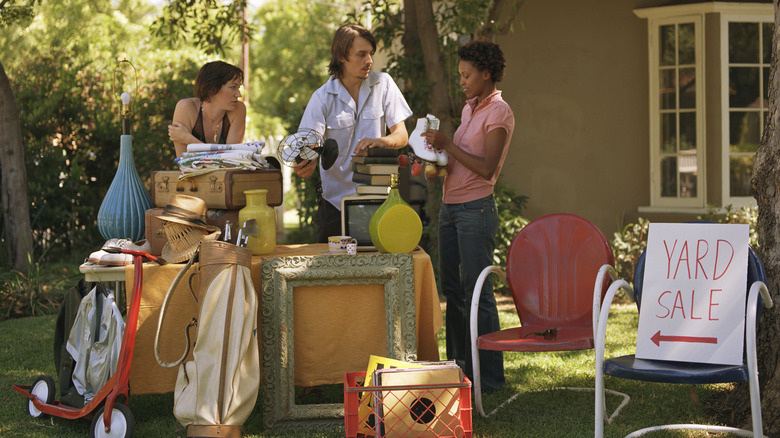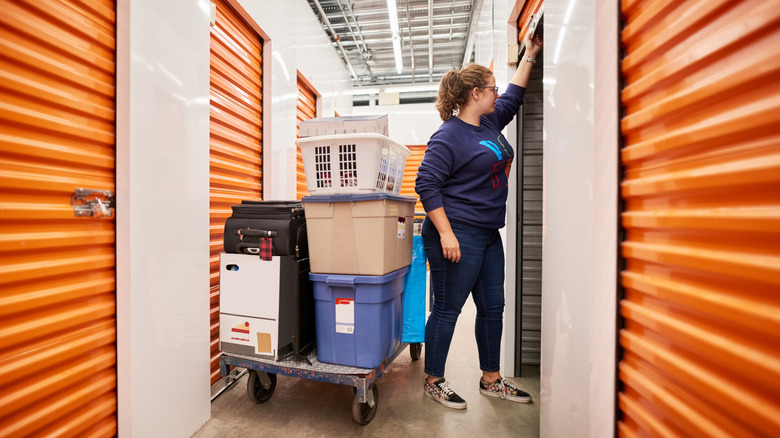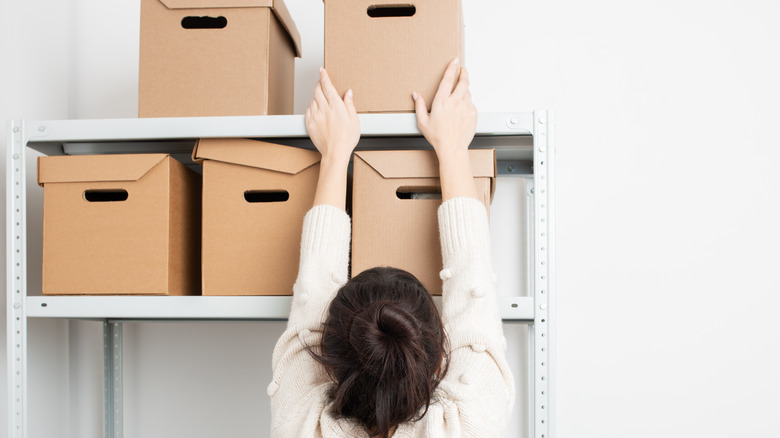Things You Have To Stop Doing When Decluttering
The concept of decluttering seems simple enough on the surface. You just go through your stuff and get rid of the things you no longer want or need. How hard can it be?
The answer is, it can be surprisingly complicated. Clutter is an universal problem, and while it's easy to move things around for a bit, keeping your home tidy is a difficult prospect. We all know what we should do, and there are plenty of places where you can learn the best strategies for decluttering your home. The problems start when we get into the decluttering process and get caught up in things we shouldn't be doing. It's easy, for example, to get trapped reminiscing when we come across sentimental items. We often try to tackle too much clutter at one time as well. These and other common missteps can slow the process down or even stall it altogether.
Fortunately, if you can identify the things you need to stop doing when you declutter, then you can avoid them. This will make the process easier, faster, and more effective so that you can kick the clutter out of your life for good — along with all the anxiety it brings with it.
Don't declutter when you're angry
When the clutter has reached the point where it makes you angry, resist the urge to just toss it all. Maybe, for example, you're cooking dinner around a cluttered countertop. You try to set a plate of food on the counter and because you're trying to avoid a pile of junk, you end up dropping the plate on the floor. It's tempting to grab the trash can and clear away the whole rat's nest with a sweep of your arm. Unfortunately, eliminating the chaos this way can cause mistakes — and lead to digging through the trash can later for the things you should have kept.
No matter how strong the urge to just grab the trash can and start chucking things is, you have to be an adult about it. Decluttering is about getting rid of things, but mess is there for a reason. At some point, all of those papers on your desk, books on your nightstand, and trinkets in your junk drawer got there because they were things you wanted to keep. There may still be things amidst the mess that you need to hold onto. Take a pause and wait until you are in a better frame of mind to make good decisions that aren't based on emotion. When it comes to decluttering well, mindset matters.
Don't take too long to decide
Don't get caught in the trap of simply moving clutter from one place to another because you can't decide what to do with it. Doing this only delays the inevitable while keeping clutter in your life. The longer you argue with yourself about whether something should stay or go, the more likely you are to talk yourself into keeping it.
When dealing with clutter, remember the acronym OHIO: only handle it once. Make a decision about every item you pick up when you pick it up. Don't be afraid to trust your instincts. If your first impulse on picking up an item is to toss it or throw it into the donation pile, you probably should. Sometimes you may encounter things you're unsure about, such as a power cord you can't identify. In that case, it's OK to keep a small box of items you truly might need. Write the date on the box and put it away. If you haven't opened it in a year, throw it away. And no peeking when you do! Just toss it.
Similarly, you can implement a hanger trick to help declutter your closet. Flip all of the hangers in your closet so that they face backward. When you wash your clothes, put them away normally. At the end of the year, the hangers that are still backward will clearly show you what clothing you haven't worn. Pack the items up and donate them.
Don't insist on selling
Apps like Vinted and sites like Amazon and Facebook Marketplace have shown millions of declutterers that they can turn a profit by selling their used items online. And sure, trying to sell objectively valuable items you no longer need is certainly worthwhile. But how much effort are you really willing to put into trying to sell old stuff for less than $10 at a time? It takes time to photograph an item, post it online, wade through emails and messages about it, navigate the postal service to get it to your buyer, and then potentially deal with missed connections or unresponsive customers. Now imagine doing that for every item in your attic. You're likely to invest a lot of time for very little money. And you still have to hang onto the items until they sell.
Even if you opt for a yard sale, which theoretically would get your stuff out a lot faster than posting it online, there are potential hangups. For one, you still need to invest the time to sell the stuff, but this time, you're likely looking at a whole morning and afternoon spent sitting in your lawn or driveway hoping people come by to buy your old vinyl records. Stuff at yard sales also tends to be priced far lower than it would be online.
Oftentimes, throwing things away or donating them makes more sense and gets clutter gone a lot faster. If you really want to eliminate clutter, boxing it up and sitting it in your garage until yard sale season just isn't practical. It's far better to throw away broken items and bless others by donating things that still have life left in them.
Don't try to do it all
Rome wasn't built in a day, and your living space can't be decluttered in one either. Don't take on more than you can realistically handle when decluttering, as this can lead to a sense of frustration and stress. You're likely to burn out and give up long before you finish if you try to tackle a seemingly insurmountable amount of clutter at once, and understandably so. You may want to give yourself a deadline for getting through the house so that the job gets done, but don't try to do it all in a single day or even a weekend. If you need some help staying on target over time, consider utilizing the 21-item toss method.
Break decluttering down into small, workable sections. Perhaps tackle a closet on Saturday and declutter the kitchen counter or your desk on a random Tuesday night. With a good strategy, you can easily break decluttering into 10-minute bursts. Break the job down into manageable chunks and celebrate your accomplishments along the way. Remember that every little bit helps.
Resist the urge to clean while you declutter
It's best to think of decluttering and cleaning as two different processes. If you clean as you declutter, you make the process take longer and are likely to get distracted by the cleaning and lose sight of your decluttering goal. It's also true that cleaning is easier when you don't have to work around clutter.
If you notice dust bunnies in the back of the cabinet you're decluttering, leave cleaning your kitchen cabinets for later. But don't let the dirt distract you from your decluttering mission. Some parts of your home will always need to be cleaned, which makes cleaning an ongoing event. Decluttering should be more of a focused mission. If you wait to clean the cabinet, the dust bunnies will still be there waiting for you. There may even be a few more. So declutter first and then get back to your routine cleaning chores.
Never, ever rent a storage unit
We can't stress this one enough. Renting a storage unit to house your stuff is the kiss of death for decluttering. It seems smart, since renting offsite storage gives you a place to house all of your stuff until you have time to go through it. But there are two issues with this. One is that once you move your clutter somewhere else, it's easy to forget about it. The other is how daunting the task of going through an entire storage unit is. It's hard enough to get through a closet!
If your cutter is so out of control that you need a place to store it, it's definitely time for a purge. Pretend you did get a storage unit and you are boxing up items to take there. Instead of moving each item, however, decide what to do with it on the spot. Donate, sell, repurpose, organize, or toss. This lets you actually get rid of what you don't need and saves you money since you won't need to rent space. If you're tempted to move all your stuff into a storage space, maybe the real solution is reorganizing your garage.
Don't buy organizational supplies
The point of decluttering is to get rid of what you don't need — not to hide your clutter in all the fun bins, compartments, and totes you buy when you're in organization mode. And if you tuck all the clutter away, you may never get around to getting rid of it. Organizing first may also mean wasting time finding homes for items you ultimately aren't going to keep. And if you don't declutter first, you won't know how much storage gear to buy or what size bins and totes you need. Organizing first is definitely on the list of what you should never do when decluttering.
You'll spend less on organizational tools if you have less stuff to organize in the first place. You'll also be better able to buy only the bins and totes you need in the right sizes. That way, when you're done organizing you have a pace for everything but no containers left over to store. This ensures that your organizational supplies themselves don't become clutter.







